‘War is not over yet’, Israeli military spokesperson warns
“The war is not over yet,” the Israeli military spokesman Avichay Adraee has said in a message in Arabic to Palestinian civilians in Gaza. In a post on X, formerly Twitter, he said:
The humanitarian pause is temporary. The northern Gaza Strip is a dangerous war zone and it is forbidden to move north. For your safety, you must remain in the humanitarian zone in the south.
It is only possible to move from the north of the Strip to the south via Salah al-Din Road. The movement of residents from the south of the Strip to the north is not allowed and dangerous
Prior to the ceasefire, Israel repeatedly bombed the south of Gaza despite telling Palestinians to flee there.
Key events
Summary
Here’s a summary of the day’s latest events:
-
A four-day truce has been called in Gaza. Attacks stopped at 7am local time (5am GMT) and Hamas is due to release 50 of the roughly 240 hostages it has been holding. The militants claimed they had also secured the release of about 150 prisoners being held by Israel in return.
-
Aid trucks began entering the Gaza Strip from Egypt around 90 minutes after the ceasefire began. Two of the trucks, representing Egyptian organisations, sported banners that said “Together for Humanity”. Another said “For our brothers in Gaza”.
-
“The war is not over yet,” an Israeli military spokesman warned. Avichay Adraee posted the message in Arabic to Palestinian civilians in Gaza on social media.
-
Spain’s prime minister Pedro Sánchez urged Israel to rethink its offensive. He told the country’s president and prime minister the number of dead Palestinians is “truly unbearable”, and that the response to Hamas’s terrorist attacks last month cannot include “the deaths of innocent civilians, including thousands of children”.
-
One woman was reportedly killed and three others wounded when Israeli forces raided the Indonesian hospital in northern Gaza prior to the ceasefire. Al Jazeera cited Dr Munir al-Bursh, the director general of the Hamas-run ministry of health in Gaza, as it reported another three people were arrested at the hospital, which has been forced to cease operations.
The first Israeli women and children to go free from Gaza on Friday under a truce with their Hamas captors will be flown home under military guard, with measures meant to reduce the duress and attend to any immediate medical complications, Reuters reports.
Ahead of the release of the first 13 hostages, who have not been identified, Israel’s air force published images of dolls, colourful throw rugs and personal hygiene kits set up at locations scheduled to receive them by helicopter.
Hamas is due to deliver the group – who are among about 240 people held in the Gaza Strip since the 7 October killing spree in southern Israel – to neighbouring Egypt. In return, Israel will release 39 Palestinians from its jails.
“Today is the first light at the end of the tunnel,” an air force lieutenant colonel said in a video briefing. “We are all in this together.”
A military statement asked the public to respect hostages’ privacy. After landing in Israel, the hostages will receive preliminary medical care and be sent to several hospitals for reunions with their families.
An Israeli official said military transport helicopters would take part in the repatriation, suggesting they would pick the hostages up at an Egyptian airport – perhaps in El Arish, near Gaza. That has not been formally confirmed by Cairo.
The helicopter crews would include a commando squad, doctors and liaison officers with training in communication and counselling – the first Israelis to greet the former captives. The Israeli official said:
The personnel will introduce themselves by name, with a visible face and a smile, and maintain eye contact and distance in order to allow the caregivers and support teams to do their work in the best possible way.
Among other measures designed to reduce stress would be the issuing of noise-cancelling headphones, including for the children among them, “to make the flight experience easier and provide them with peace and quiet,” the official said.
Health officials have said separately that the hostages would receive psychological attention and specialised care for any who may have been sexual assaulted.
While the adults released can expect to be questioned by Israeli security officials for information about their captivity and the fate of the others still held by Hamas, the child hostages will be spared this, local media reports have reported.
Four hostages have been returned alive previously while a fifth was rescued by Israeli troops. Israel has recovered the bodies of at least two more. The condition and locations of the remaining hostages are unclear.
Here are some of the latest pictures that have come in from the news wires:

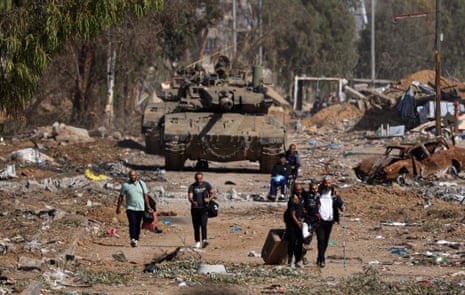

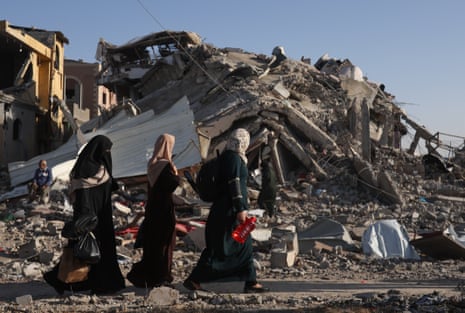
Displaced Palestinians return to their homes as they walk near houses destroyed in an Israeli strike during the conflict, amid the temporary truce between Hamas and Israel, in Khan Younis in the southern Gaza Strip. Photograph: Ibraheem Abu Mustafa/Reuters
Israel’s fledgling rapprochement with Morocco, which had made steady progress in the three years since the two governments normalised relations, has been thrown into reverse by the deadly conflict in Gaza, AFP reports.
Pro-Palestinian demonstrators have returned to the streets of the north African nation, as Hamas officials claim the death toll from seven weeks of Israeli bombardment in Gaza has risen to nearly 15,000, mostly civilians.
The Israeli liaison office in Rabat was reportedly evacuated last month amid security concerns.
All flights between the two countries have been suspended since the 7 October attacks by Hamas, which Israeli officials claim killed at least 1,200 people, also mostly civilians.
Israeli visitors have disappeared from Moroccan tourism hubs such as Marrakesh and Essaouira, along with many of the restaurants opened to cater for them
“Overnight there was no one left,” said Michel Cohen, the French-Israeli owner of a kosher restaurant in Marrakesh that is now closed. “The Israelis that were there have left. They were very scared.”
Out of 14 kosher restaurants that had opened in Marrakesh since Morocco’s normalisation of relations with Israel in 2020, 12 have closed.
European security officials are seeing a growing risk of attacks by Islamists radicalised by the war, with the biggest threat likely to come from “lone wolf” assailants who are hard to track.
More than 10 intelligence and police officials in five European countries including Britain, Germany and France have told Reuters they are increasing surveillance of Islamist militants.
This will put a further burden on resources already stretched by dealing with perceived threats from Russia, China and Iran, in what London’s Met police chief, Mark Rowley, calls “one of the most challenging convergence of threats I have ever seen”.
A British security official has said the war in Gaza is likely to become the biggest recruiter for Islamist militants since the Iraq war in 2003, and that calls for attacks on Jewish and western targets have risen in Europe.
A German source briefed by intelligence services said the threat to civilians was the highest in Germany’s recent history, with dangers coming from Islamist militants, far-right groups and Russia.
Two Islamist militant attacks in France and Belgium last month killed three people, and these two countries plus Austria, Slovenia and Bosnia-Herzegovina have raised their terrorism threat alert levels. Italy has reimposed border controls with Slovenia, citing the risk of militants entering the country.
“There is going to be a blowback that is going to be felt for years,” the British official told Reuters.
We reported earlier that the Israeli military had said warning sirens were sounding Eilat, amid fears of a long-range aerial attack launched from Yemen. The country’s armed forces have now said it was a false alarm and there is no indication of any security incident, Reuters reports.
France’s top diplomat, Catherine Colonna, has met the Chinese premier, Li Qiang, and the foreign minister, Wang Yi, in Beijing during a short visit focused partly on the Israel-Hamas war. Agence France-Presse (AFP) quotes her as saying:
For us, all the hostages must be released. All, and not just 50.
About 240 people were abducted during Hamas’s cross-border attacks on Israel last month.
Paris has said the conflict will be high on the agenda for Colonna and her Chinese counterparts.
“China is an actor with growing weight in the region” due to its strong relationship with Iran, a French diplomatic source said this week. “The first thing we expect from China in this conflict is to join its efforts with ours to ensure that we avoid any regional escalation.”
Beijing has recently sought to play a greater role in the Middle East, facilitating a historic rapprochement between Saudi Arabia and Iran and sending an envoy to the region to push for a ceasefire in the Israel-Hamas conflict.
Sirens have sounded in Israel’s southern Red Sea resort of Eilat, warning of a possible long-range aerial attack from Yemen, Reuters quotes the country’s military as saying. Yemeni Houthis have previously launched drones and missiles at Israel in solidarity with Palestinian militants.

Jason Burke
In the crowded corridors of the European hospital in Khan Younis, exhausted doctors decide who among the huge influx of patients arriving from the north of Gaza should live or die.
Hundreds of casualties have moved south in recent days after the evacuation of hospitals in Gaza City, overwhelming medical staff already struggling with an acute lack of medicine, diminishing food rations and intermittent power and communications.
Injured people have joined thousands of displaced people seeking shelter and safety in medical facilities.
Paul Ley, an orthopaedic surgeon at the European hospital, said displaced people were sleeping in lifts, a small team was working round the clock in four operating theatres to amputate limbs infected after days without treatment, and there was an acute shortage of painkillers. Triage decisions had to be made instantly, which in one case meant leaving a 12-year-old child to die with only palliative care in order to preserve dwindling resources.
Ley said the hospital had received 500 patients evacuated from hospitals in northern Gaza in recent days.
The UK foreign secretary, David Cameron, is continuing his trip to the Middle East on Friday, meeting Palestinian leaders and committing the UK to a further £30m in aid for people in Gaza.
He will be in the occupied Palestinian territories, meeting Palestinian leaders and agencies delivering aid in Gaza and advocating adherence to the new agreement on all sides. Talks will focus on how UK efforts can help ease the suffering of Gaza’s citizens, who have been bombarded and besieged by Israel’s military, as more humanitarian aid is set to enter the territory amid the lull in fighting.
The former prime minister is urging “all parties to continue to work towards the release of every hostage” after holding talks with the Iaraeli prime minister, Benjamin Netanyahu, and the country’s president, Isaac Herzog, on Thursday.
The temporary ceasefire began at 7am local time (5am GMT). The first 13 hostages – women and children – are expected to be freed by Hamas at about 4pm local time (2pm GMT). They are the first of 50 due to be released over the four days, according to Qatari officials. Hamas said 150 Palestinian prisoners would be released by Israel.
The British daughter of a man who was kidnapped from Israel and taken to Gaza says her father would be “fighting to be at the back of the queue” of hostages to be released by Hamas.
Sharone Lifschitz told BBC Breakfast she did not know whether her father was dead or alive, only that he was taken to Gaza after being kidnapped from his home in the kibbutz of Nir Oz on 7 October. Speaking from Tel Aviv, she said:
My father spent 65 years building this community, we grew up collectively as children in my generation. If there is a queue, he is fighting to be at the back of the queue.
She said every hostage released was a “ray of light” in a “long and horrendous story”. Lifschitz’s mother, Yocheved Lifshitz, was released by Hamas from Gaza last month.
The UK prime minister, Rishi Sunak, has thanked Qatar and Egypt for their “intensive diplomacy” in helping to secure the pause in the fighting in Gaza.
The temporary truce came into effect early on Friday, setting the stage for the exchange of dozens of hostages held by militants in Gaza for Palestinians imprisoned in Israel.
Sunak tweeted: “This humanitarian pause is critical to end the terrible ordeal of hostages held by Hamas and get life-saving aid into Gaza.
“I want to thank Qatar, Egypt and others for the intensive diplomacy that has got us here. We will not stop until all hostages are safely returned.”
People in Gaza are salvaging what they can as the guns fall silent.
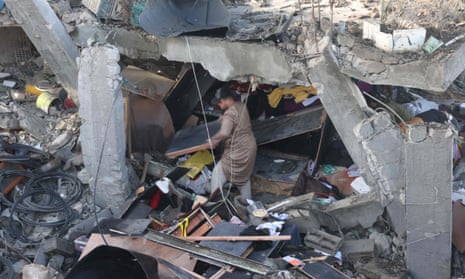
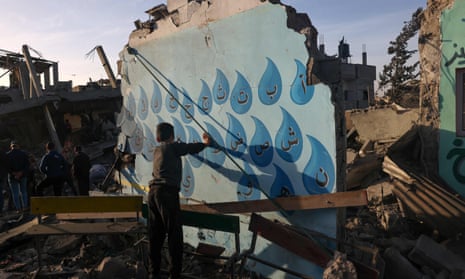
Aid trucks have been pictured as they enter Gaza via the Rafah crossing hours after the start of a four-day truce.
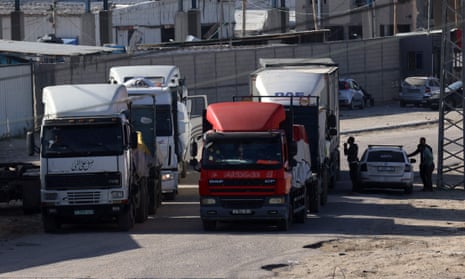
Aid trucks begin entering Gaza, Reuters reports
Aid trucks have begun entering the Gaza Strip from Egypt around 90 minutes after a truce began between Israel and Hamas fighters, according to Reuters TV footage.
Two of the trucks, representing Egyptian organisations, sported banners that said “Together for Humanity”. Another said “For our brothers in Gaza”.